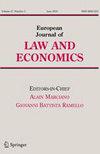Corporate criminals in a market context: enforcement and optimal sanctions
IF 1.1
3区 社会学
Q3 ECONOMICS
引用次数: 0
Abstract
Abstract By combining approaches from the economic theory of crime and of industrial organization, this paper analyzes optimal enforcement for three different forms of corporate misconduct that harm competition. The analysis shows why corporate crime is more harmful in large markets, why governments have a disinclination to sanction firms whose crime materializes abroad, and why leniency for those who self-report their crime is a complement, and not a substitute, to independent investigation and enforcement. As public authorities rely increasingly on self-reporting by companies to detect cartels, the number of leniency applications is likely to decline, and this is borne out by data. Upon a review of 50 cases of corporate liability from five European countries, competition law enforcement, governed by a unified legal regime, is more efficient than enforcement in bribery and money laundering cases, governed by disparate criminal law regimes. Sanction predictability and transparency are higher when governments cooperate closely with each other in law enforcement, when there are elements of supra-national authority, and when the offense is regulated by a separate legal instrument. Given our results, Europe would benefit from stronger supra-national cooperation in regulation and enforcement of transnational corporate crime, especially for the sake of deterrent penalties against crime committed abroad.市场背景下的企业犯罪:执行和最佳制裁
本文结合犯罪经济学理论和产业组织经济学理论,分析了三种妨害竞争的企业不当行为的最优执行。分析显示了为什么公司犯罪在大市场中危害更大,为什么政府不愿意制裁那些在国外犯罪的公司,为什么对那些自我报告犯罪的人的宽大处理是对独立调查和执法的补充,而不是替代。由于政府当局越来越依赖公司的自我报告来发现卡特尔,宽大处理申请的数量可能会下降,这一点得到了数据的证实。根据对来自五个欧洲国家的50个公司责任案件的审查,由统一法律制度管辖的竞争法执法比由不同刑法制度管辖的贿赂和洗钱案件的执法更有效。当各国政府在执法方面相互密切合作,当存在超国家权力的因素,当犯罪行为受到单独的法律文书管制时,制裁的可预测性和透明度就会更高。鉴于我们的结果,欧洲将受益于在跨国公司犯罪的监管和执法方面加强超国家合作,特别是为了对在国外犯下的罪行进行威慑性惩罚。
本文章由计算机程序翻译,如有差异,请以英文原文为准。
求助全文
约1分钟内获得全文
求助全文
来源期刊

European Journal of Law and Economics
Multiple-
CiteScore
2.40
自引率
7.70%
发文量
37
期刊介绍:
The European Journal of Law and Economics provides readers with high-quality theoretical and empirical research in which both the legal and economic dimensions merge and combine. The journal welcomes articles that promote a better understanding of legal phenomena, legal decisions made by judges, courts or regulatory agencies, and involving economic tools. Theoretical papers are welcome, provided they have a strong basis in law and economics. We also welcome case studies, as well as empirical analyses – including empirical legal studies – and experimental investigations. The European Journal of Law and Economics does not favor any particular topic, but does have a focus on new and emerging problems. European themes are particularly welcome, because we feel it is important to exploit Europe’s considerable institutional diversity in order to build a more robust body of theory and empirical evidence. However, the purpose of the journal is also to showcase the diversity of law and economics approaches, as supplied by an international mix of authors. Drawing on the support of respected scholars from around the world, who serve as consulting editors and editorial board members, the Editors wish to give contributing authors the opportunity to improve their papers, while also offering them a quick and efficient review process.
Officially cited as: Eur J Law Econ
 求助内容:
求助内容: 应助结果提醒方式:
应助结果提醒方式:


